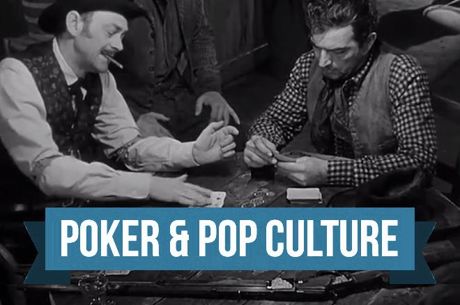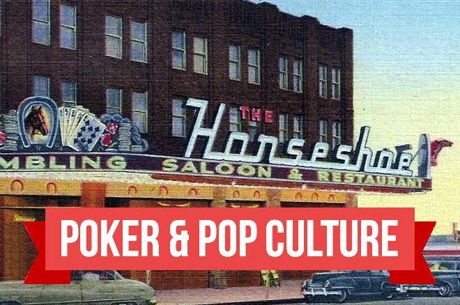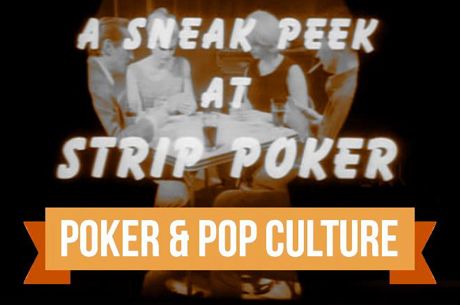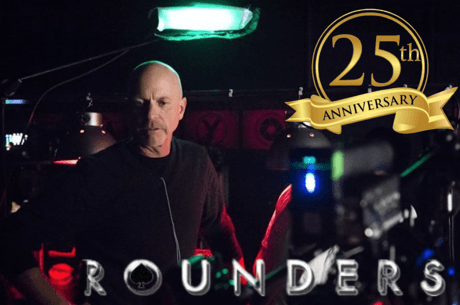Poker & Pop Culture: Disorder in the Cards in American Westerns
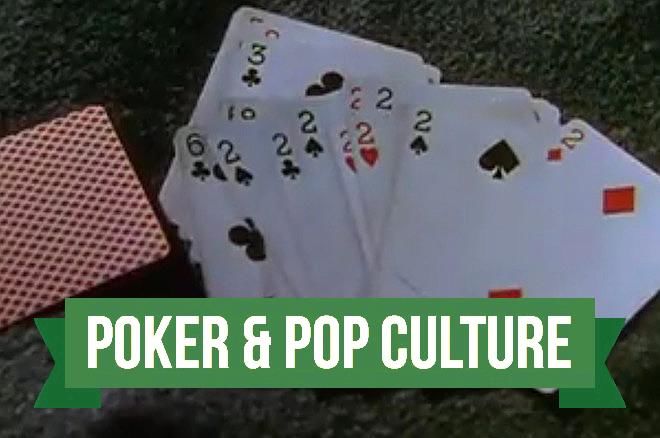
Picking up once more our survey of "classic westerns" featuring the favorite card game of the Old West, the films we previously examined �� Sunset Trail (1939), Tall in the Saddle (1944), Winchester '73 (1950) �� all conspicuously shared a common element. All portrayed the film's villains playing poker �� and losing.
With varying degrees of subtlety, the poker games in those films all served to foreshadow the conclusions of their larger narratives. Just as the villains lost their poker games, so, too, in the final reel did they find themselves on the wrong end of more serious "showdowns" versus the film's heroes.
Such endings were standard for the often conservative, status quo-affirming westerns of the classic era (1930s through the 1960s). While there were some notable exceptions �� so-called "revisionist" westerns that directly questioned traditional themes �� the majority reaffirmed a comfortable, "romantic" or idealized version of the Old West that underscored ideas of American progress and achievement.
In such a context, the game of poker often served as a kind of emblem of disorder �� a cause of trouble that often threatened ideas of stability in the towns and on the trails of the Old West. In other words, in these cinematic stories of American settlers, poker is often unsettling.
Moving ahead in the chronology of films, let's consider three more westerns in which poker similarly serves to upset the tenuous balance of the worlds they portray.
The Lawless Breed (1953)
This Rock Hudson vehicle directed by Raoul Walsh features a higher-than-average amount of action, including numerous chase scenes and gunfights. Hudson portrays the real-life Old West figure John Wesley Hardin, and the film purports to dramatize Hardin's own autobiography penned in prison and published shortly after his death in 1896.
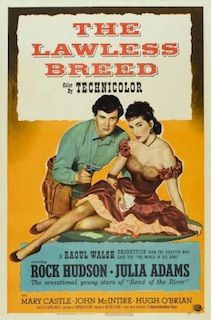
Historians have noted how Hardin's memoir took numerous liberties with the truth. The Lawless Breed alters his story even further, making Hardin �� in real life a malicious outlaw reported to have killed 27 (though he himself claimed 42) �� into a kind of victim undeservedly targeted for crimes of which he isn't guilty. The film even finds a way to create a happy ending to Hardin's story, stopping just shy of his being killed by an angry constable at age 42.
Hardin does speak of playing various gambling games in his autobiography, including faro, euchre, seven-up and poker, although his card-playing isn't necessarily a huge part of his story as he tells it. The Lawless Breed meanwhile makes it a central part of the character, and from the very start of the film positions poker as a kind of first step down a dangerous path for "Wes" �� a primary cause of all his problems.
The tone is set right away by Hardin's preacher father who mercilessly whips his son after discovering he's bought a gun with money won from poker. "You've grown strong in the house of the Lord!" cries the elder Hardin as he cracks his whip. "With the help of the Lord I may yet conquer the evil in you."
But the scene ends with Hardin gathering up his cards, and soon there's a cross cut to the cutting of a deck �� the "preacher's boy" is right back at a poker table.
The game is five-card draw. Hardin, who had been studying law, arrives and somewhat improbably sells his law books to the proprietor for $20 with which he then joins the game �� a bit of obvious symbolism suggesting Hardin has turned his back on the law to be a gambler instead.
He spins up his money, then gets into a big hand with a lone opponent, Gus Hanley. We pick it up on the draw, with Hardin taking one card and Hanley two. Hardin then bets $50, and Hanley calls, turning over three kings. But Hardin has a flush.
"You gave me four clubs going in," says Hardin. "And you just gave me this one," he adds, flashing his fifth club.
"Where'd you get that card?" Hanley objects. "You gave it to me," repeats Hardin. "Why... I gave you a heart!" says Hanley who tries to draw his pistol, but Hardin is faster and shoots him dead.
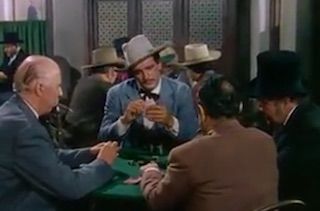
It's the beginning of hard times for Hardin, as he soon finds himself a fugitive from justice. He kills more men �� always in self-defense �� before eventually getting caught and imprisoned as no one steps forward as a witness to testify on his behalf.
In the film, poker �� and other forms of gambling, as Hardin is shown playing roulette and racing horses for money, too �� is unambiguously presented as a reason for his constant hardship. He's being treated unfairly, sure, but it's clear that if he had been able to steer away from the cards, he'd have avoided other trouble as well.
Incidentally, as that hand above suggests not only did Hardin's opponent try to cheat, but Hardin himself cheated, too, by producing for himself a fifth, flush-making club. He's shown later winning another poker hand, also by outcheating an opponent trying to cheat him. In that one Hardin turns up with four aces and a deuce at the showdown, when his opponent insists he'd dealt him deuces instead.
"You need to practice up a little," laughs Hardin. "I just need a new deck!" says his opponent as he tosses down the cards to reveal nine deuces!
Poker serves as a gateway to trouble in The Lawless Breed. And it's presented as a corrupt, morally-bankrupt game in and of itself �� a context to cheat and be cheated, and risk the consequences if caught or if trying to call out others.
Rio Bravo (1959)
Better is the Howard Hawks-directed Rio Bravo, an influential western starring John Wayne as Sheriff John T. Chance who is struggling to maintain order in the Texas town of the film's title.
Eventually Sheriff Chance finds himself in a somewhat desperate situation. Having arrested and jailed a man for murder, the man's brother and a gang of hired killers plot to bust him out, and Chance finds himself under siege at the town's jail until reinforcements can arrive. For help he has the town drunk Dude (Dean Martin), the elderly Stumpy (Walter Brennan) and the young, untested Colorado (Ricky Nelson).
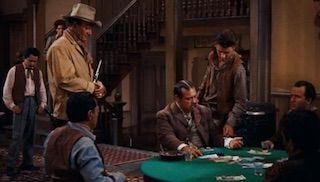
Rio Bravo doesn't feature poker that much beyond games being incidentally played by those sitting around saloon tables. There is one subplot, however, involving Angie Dickinson's character, named Feathers, who falls under suspicion for having cheated at poker when a deck is found to be missing three aces.
Chance initially suspects Feathers, but it turns out she is innocent, as another player in her game was the one pilfering the cards. Young Colorado helps the Sheriff sort things out by literally pulling the three aces from the guilty party's sleeve.
Feathers, it seems, has a past, being associated with a card sharp and as a result described on a handbill that casts suspicion on her character wherever she goes. Chance discusses the situation with her afterwards.
"You could quit playing cards," he suggests to her, citing a source of her ongoing trouble. But Feathers refuses, and later proves herself by helping the others during the siege.
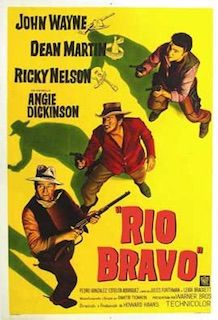
It's tempting to trace some sort of symbolic link between the three aces taken from the deck and the characters of Chance, Dude and Stumpy �� the three who initially find themselves holed up in the jail prior to the film's climax.
Of course, calling those three "aces" would be an ironic reference. Though tough and ready for the challenge, Chance's age marks him as vulnerable. Meanwhile Dude's status as a recovering alcoholic (who may relapse at any moment) makes him an uncertain ally, while Stumpy is even older than Chance and walks with a limp.
In truth, Chance, Dude and Colorado are probably better regarded as the "three aces" here, as Wayne, Martin and Nelson were often highlighted in publicity photos and posters.
In any event, in this entertaining and thoughtful western card-playing is obviously a distraction �� and potential cause of trouble �� amid much greater concerns. Life itself is enough of a gamble, surmises Sheriff Chance.
How the West Was Won (1962)
Finally the sprawling epic How the West Was Won also incorporates poker via one of its dozens of characters. Like other westerns the film presents the game as both integral to the Old West setting and representative of a potential source of trouble for those taking part.
Lasting the better part of three hours, the film's five sections (with multiple directors) trace the story of a single family through four generations from the 1830s through the 1880s. The second section introduces the gambler Cleve Van Valen, played by Gregory Peck, who becomes enamored with Lilith Prescott (Debbie Reynolds) soon after overhearing she's inherited a gold mine in San Francisco.
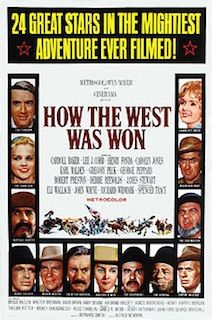
Van Valen joins Lilith's California wagon train, but his status as a poker player makes him immediately suspicious to the wagonmaster, Roger Morgan.
"When a wagon breaks down I want men who can fix it, not bet on how long it'll take," complains Morgan.
As if to underscore the dangers of playing poker in a literal way, Van Valen gets a bumpy game going in a covered wagon, sitting facing away from the opening in back. Just as he's raised and gotten called, someone riding behind the wagon suddenly pulls him out of it onto the ground.
It's Morgan. "I told you I wouldn't stand for you fleecing any..." he begins, but the pair are soon interrupted by an attacking tribe of Indians.
Van Valen proves himself during the ensuing battle, and later on will win Lilith's affection and hand in marriage. In fact, she suggests they open a gambling house, though Van Valen objects, recognizing how poker can disrupt familial order.
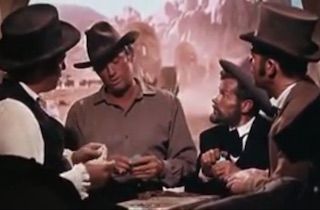
"A married man should spend his evenings at home," he insists.
Much later in the film's final section, Lilith is a widow. She tries to comfort her nephew's wife who is worried about her lawman husband's impending showdown with an outlaw, and brings up the story of her late husband's poker-playing.
"I guess there's nothing more pig-headed in a man than his sense of honor. They're all the same, every one of them. You take my Cleve, now. Never could turn down a poker game. Felt duty-bound to go. Three nights running sometimes, but he wouldn't quit �� not if his life depended on it."
The point isn't insisted upon too heavily, but here again poker is represented a threat to order, a game involving risk-taking that is viewed as distracting at best, and dangerous at worst.
Conclusion
How the West Was Won is a good example of a classic western presenting a traditional, uncritical assessment of the Old West as a context for celebrating American achievement.
"The West that was won by its pioneers, settlers, adventurers is long gone now, yet it is theirs forever, for they left tracks in history that will never be eroded," lectures narrator Spencer Tracy as the film concludes. He adds that out of such figures' lives "grew legends of courage and pride to inspire their children and their children's children."
Shots of natural landscapes are then replaced with scenes of interstates, buildings, modern cities and the San Francisco Bridge, reinforcing the connection between past and present �� and the idea of a kind of inevitable march toward civilization and progress begun by the Old West pioneers.
It makes sense to connect poker��s early rise in popularity to the way the game satisfies the same compulsion to take risks that motivated 19th-century pioneers. But in many classic westerns depicting the era, the advancement of the frontier sometimes seems to have occurred in spite of the disorder caused by gambling on cards.
From the forthcoming "Poker & Pop Culture: Telling the Story of America's Favorite Card Game." Martin Harris teaches a course in "Poker in American Film and Culture" in the American Studies program at UNC-Charlotte.

